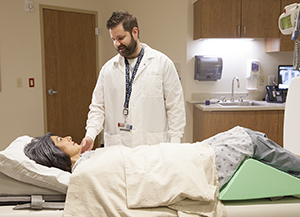An intravenous pyelogram (IVP) is an X-ray exam of your urinary tract (kidneys, ureters, and bladder). This test can help find stones or other problems with your urinary tract. IVP is not used very often. CT and ultrasound are more often used.
How do I prepare for an IVP?
-
Follow all instructions on what to eat and drink before the test.
-
If instructed, take a laxative the night before your IVP.
What to tell your provider
-
Allergies, especially to iodinated intravenous (IV) contrast. This is a substance that improves X-ray images. You can still have an IVP if you are allergic to the contrast substance, but you will need to take a medicine beforehand.
-
Previous kidney or bladder problems
-
Diabetes medicine you take
-
Any previous surgery or recent illness
-
If you are or may be pregnant
What are the risks of an IVP?
Risks linked to IVP include:
-
Radiation exposure
-
Reaction to the contrast substance. The reaction can be mild (itching, hives, nausea) or severe (difficulty breathing, swelling of the throat, drop in blood pressure).
-
Worsening of kidney damage
What happens during an IVP?
-
You will likely have the test at a hospital or outpatient testing center.
-
Your healthcare provider will give you an IV (intravenous) injection of contrast into a vein in your hand or arm.
-
You’ll be asked to move from side to side and then hold still as X-rays are taken.
-
Your healthcare provider may apply pressure to your belly to help get the best images.
-
You may be asked to empty your bladder before the final X-ray.
Your test results
Your healthcare provider will discuss the test results with you during a follow-up visit or over the phone.
Your next appointment is: _________________


